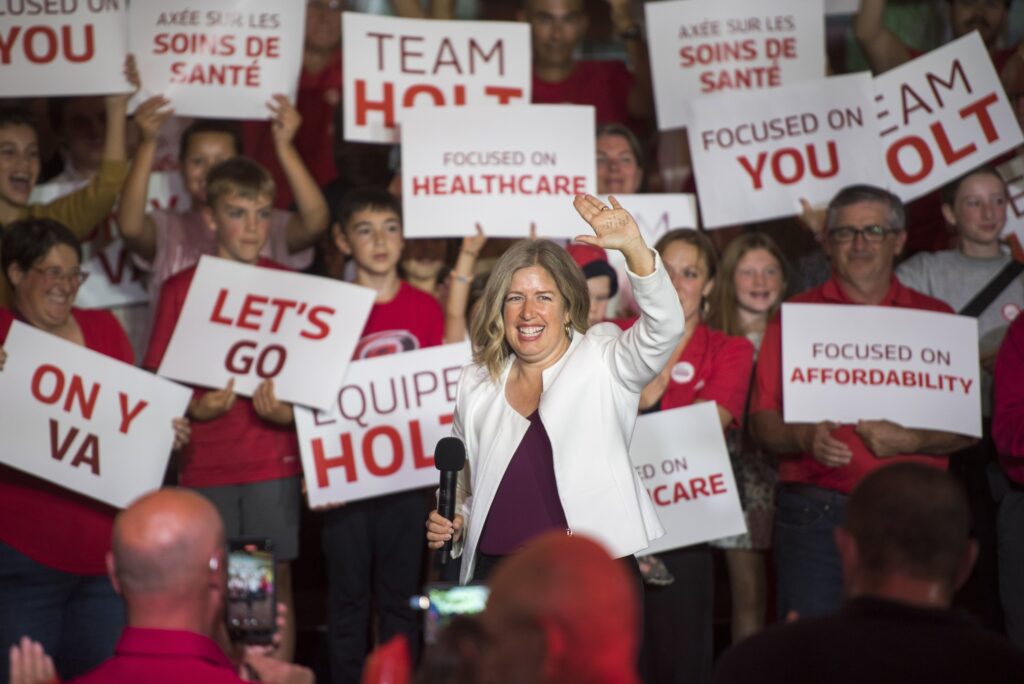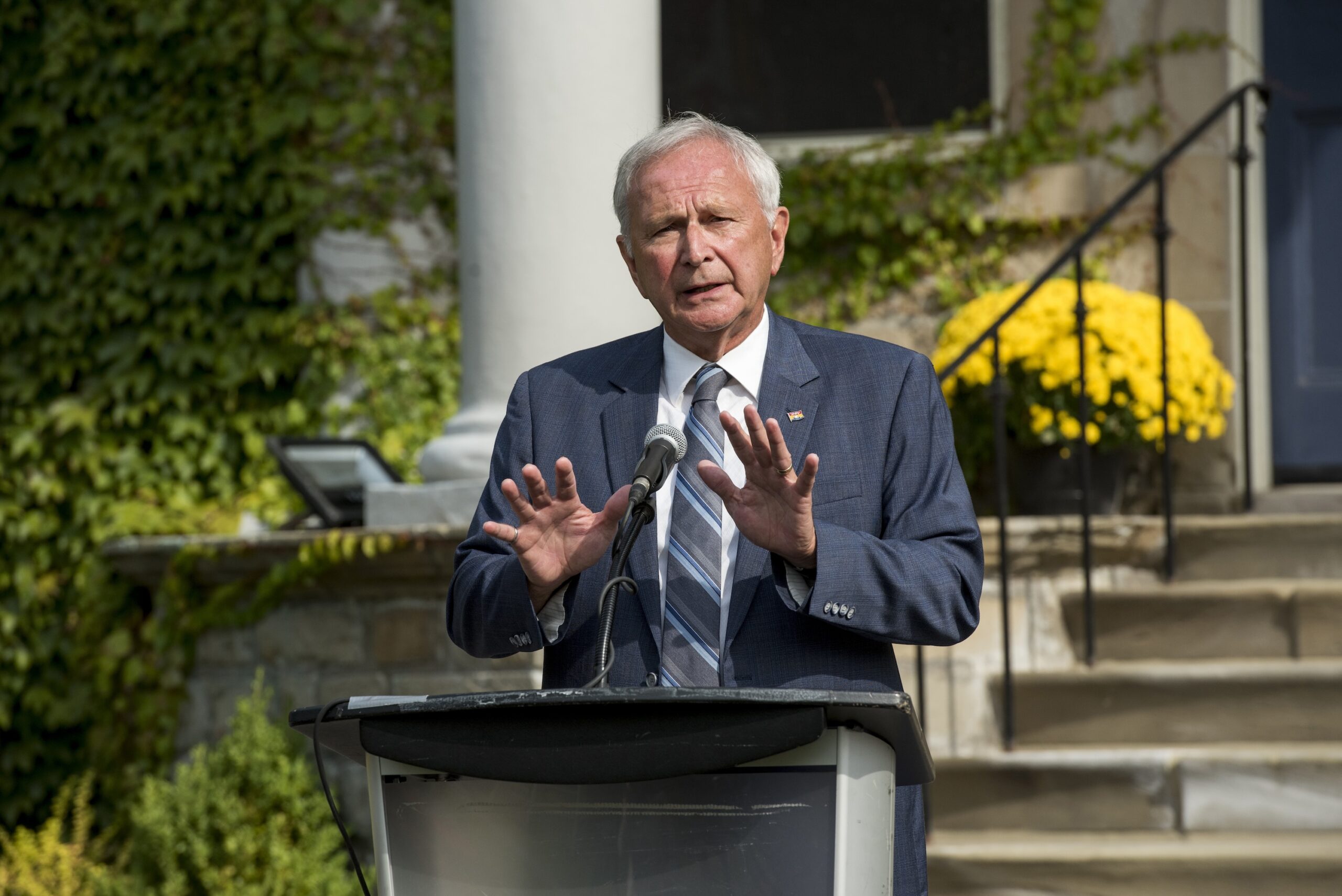New Brunswick Premier Blaine Higgs is seeking a third term for his Progressive Conservative government. As PC MLA for Quispamsis since 2010, Higgs has led the PC Party since 2016 and has been premier since 2018. Prior to politics he had a multi-decade career at Irving Oil Ltd, retiring as Director of Logistics.
The election is a close race between the PC and Liberal parties. Susan Holt became leader of the Liberal party of New Brunswick in 2022 and won a seat in the legislature representing Bathurst East-Nepisiguit-Saint-Isidore in 2023. Prior to politics, Holt had worked in Human Resource Management as well as at the NB Business Council and the NB Jobs Board Secretariat.
Holt is from Fredericton and is now running in a Fredericton district (South-Silverwood). Her main challenge may come from the Green Party, as the district is one of two districts created with the splitting of Green Party Leader David Coon’s Fredericton South. The Green Party has maintained a beachhead in Fredericton for a decade.
Since mid 2021, the Liberals have generally held a lead that has varied in size, with the incumbent PCs not posting in the lead outside the margin. With both major parties’ campaign style communications and tours running since Spring 2024, the gap between the two parties has generally tightened. The latest Mainstreet poll (Sept 15-17) has the Liberals at 41% of decided voters, the PCs at 39%, the Green Party at 14% and the People’s Alliance at 4%. While NDP support levels were not separately reported, support for “other parties” was at 3%.
Key issues
The Higgs PCs are attempting to run on their fiscal and economic record, pointing to balanced budgets, various forms of tax relief, low unemployment, healthcare recruitment and a promised HST cut to address concerns about rising cost of living. Susan Holt and the Liberals are running a campaign for change, trying to capitalize on Higgs’ relatively low leadership approval ratings (lowest of all the premiers) – promising to pay more attention to healthcare and education – two areas that have faced serious capacity and recruitment challenges.
Premier Higgs has faced criticism from the opposition parties as well as members of his own caucus over social issues, in particular, the revision of Policy 713, an education policy related to students identifying as LGBTQIA2S+. One of the provisions of the original 2020 policy required school personnel to use students’ preferred pronouns and chosen names. The revised 2023 policy included changes that forbade New Brunswick teachers from using those names and pronouns of students under the age of 16 without parental consent. This led to some internal division within the Progressive Conservatives, including resignations, nomination disputes and several PC MLAs opting not to run in 2024.
Susan Holt has been distancing herself and the New Brunswick Liberal Party from Prime Minister Justin Trudeau and the federal Liberal government’s very unpopular carbon tax and related policies. In March, she wrote to the Prime Minister calling for a pause in the carbon tax, drawing criticism from Higgs for stopping short of calling for the tax’s abolition.
Regional factors
There are 49 provincial constituencies in New Brunswick, 17 of which have francophone majorities. In order to form a majority government, a party must win at least 25 seats.

Both major parties have traditional regional strongholds, with the Liberal party stronger in francophone/northern districts and the PC Party strongest in southern/anglophone parts of New Brunswick. Any path to a government for either party hangs on retaining their strongholds and winning enough of the districts in central and eastern New Brunswick on the outskirts of the cities of Fredericton and Moncton.
Third parties have played a larger role in past elections, with the Peoples Alliance of New Brunswick winning two seats and the Green Party winning 3 seats in the 2020 election. The People’s Alliance MLAs abandoned the party in 2022, opting to join the governing PCs. Green Party support remains stable, with their support strongest in Fredericton and eastern N.B. It remains to be seen whether this will present any challenges for Liberal candidates in those regions where the party would need to pick up seats.
With upwards of a third of the PC incumbent MLAs not running again, there are a lot of new PC candidates in Saint John and other parts of southern New Brunswick. Local non-incumbent PC candidates may be less weighed down by the baggage of the Higgs government, but may also lack the name recognition and star power of the outgoing veteran MLAs.
The federal dynamic
A major question to be resolved by the election is whether and how federal trends might affect the provincial political parties. Support for the Liberal Party of Canada has plummeted in Atlantic Canada since the last federal election, dropping by 15 points on average. Conservative support has increased by a similar amount. Throughout the region, provincial Progressive Conservative leaders have called for the abolition of the federal carbon tax and criticized the Trudeau Liberal government on other issues, including natural resources and energy development. Provincial Liberal leaders have mostly tried to distance themselves from these federal policies, but with limited success.
Election key dates
- September 19 – Writs issued and official campaign begins
- September 24 – Special ballots request period opens
- October 1 – Deadline for nomination of candidates
- October 12 – Advance Polls (Day 1)
- October 15 – Advance Polls (Day 2)
- October 19 – Deadline for candidates to withdraw
- October 21 – Deadline for receipt of Special Ballots
- October 21 – Election day!
